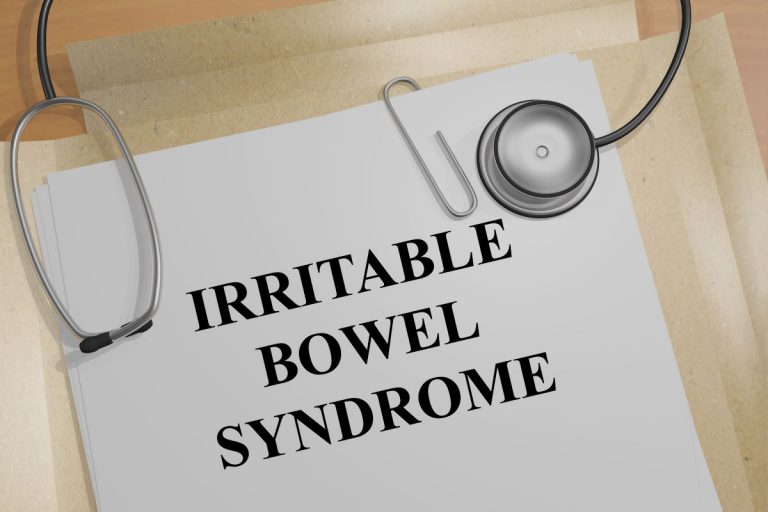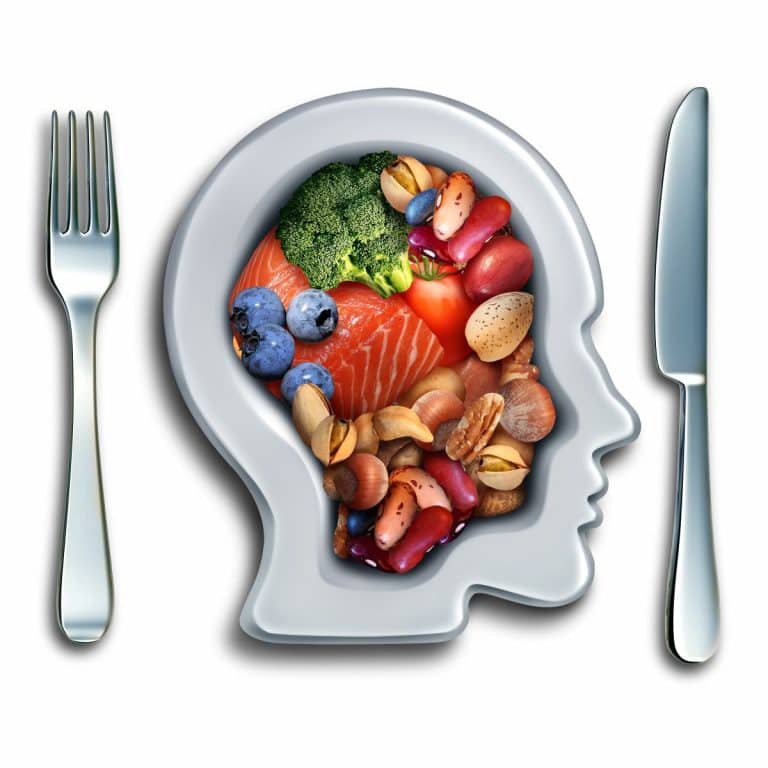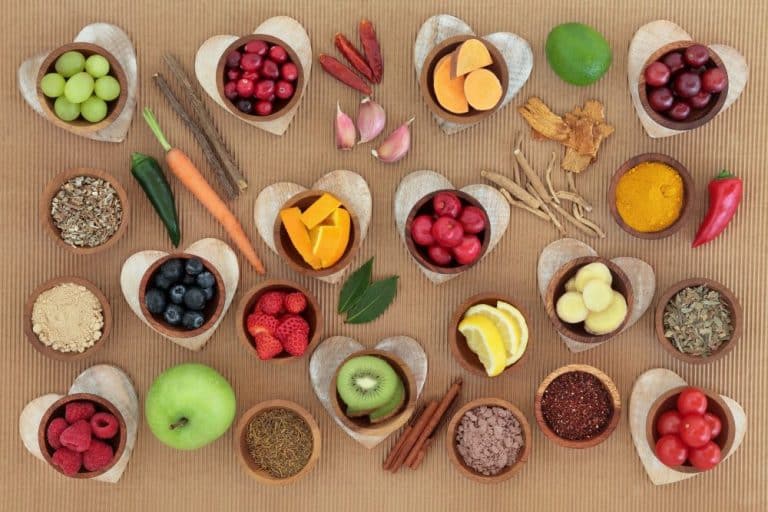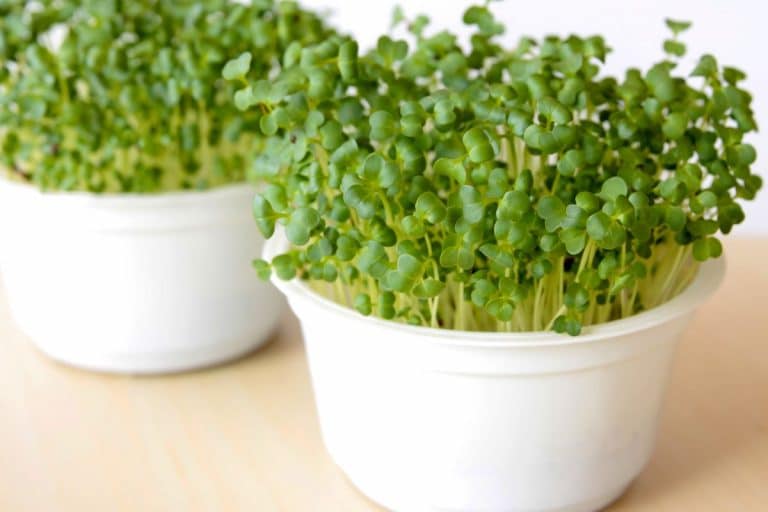HOW TO INCREASE GABA NATURALLY
Suffering from anxiety?
Also, are looking to improve your sleep?
Maybe trying to relax your nervous system?
Want to know how to increase GABA naturally and if it works?
We get it.
Have you read about GABA? What is GABA (Gamma-Aminobutyric Acid)?
In this review, we will discuss the brain, neurotransmitters, and all about GABA and how to increase it naturally.
Read on…
Want to get a copy of this article? Click here to download this article.
This information is for educational purposes only. As with any medical advice, always check with your doctor or healthcare professional for personal and age-appropriate recommendations.
Table of Contents
The Brain and Neurotransmitters
Neurotransmitters regulate functions in the brain including breathing, heart rate, sleep, mood, digestion, and appetite. They are the body’s chemical messengers (1).
Some of the more common neurotransmitters are dopamine, norepinephrine, serotonin, and GABA.
You may have heard the phrase by Hippocrates “All disease begins in the gut”. Recent studies are reviewing the relationship between the gut and brain and calling it the “gut-brain axis” (2).
Scientists are referring to this gut bacteria that might be beneficial to mental health as psychobiotics (3).
What is GABA?
GABA or gamma-aminobutyric acid is an amino acid that is the main inhibitory neurotransmitter in the brain. It reduces the activity of nerve cells in your nervous system.
Without enough GABA, nerve cells respond quickly and can lead to anxiety and other mental health conditions.
“GABA is a neurotransmitter that inhibits neural activity in the brain, and its misregulation has been linked to depression and other mental health problems” (4).
GABA is produced by bacteria in the gut. Bifidobacterium and Lactobacillus have shown to be GABA producers in studies (5, 6).
Have you heard the phrase “rest and digest”?
“Rest and digest” is directed by the parasympathetic nervous system. The parasympathetic nervous system influences breathing, heart rate, and digestion.
When our system is functioning well, GABA is released and turns down the stress response which encourages relaxation and digestion.
What May Cause Low GABA?
Researchers do not know exactly what causes low GABA but it may be a combination of different factors including genetics, stress, lack of exercise, or nutritional deficiencies leading to poor gut health (7).
What are Symptoms of Low GABA?
- Anxiety
- Depression
- Stress
- Poor sleep
- Inability to concentrate
What are the Benefits of GABA?
Adequate GABA levels have been shown to reduce anxiety, stress, and increase beneficial sleep.
GABA also has shown to benefit blood pressure, blood sugar, anti-cancer, antioxidant, anti-inflammatory, anti-microbial, anti-allergic, liver, and kidney protection and improve intestinal health according to a recent study (8).
However, can GABA cross the blood brain barrier (BBB)?
Are There Any Foods That May Increase GABA Production?
We do not know if GABA can cross the blood brain barrier however, many foods which are GABA producers are also rich in healthy nutrients.
Some beneficial foods are (9):
- Adzuki beans
- Buckwheat
- Cruciferous vegetables (broccoli, cabbage, cauliflower, Brussels sprouts)
- Mushrooms
- Peas
- Rice (specifically brown rice)
- Spinach
- Sweet potatoes
- Tomatoes
Gut bacteria can also synthesize GABA so it is important to include probiotic rich foods like yogurt, sauerkraut, kimchi, and miso.
What Supplements May Affect GABA and GABA Receptors?
A combination of GABA and L-theanine has shown increased sleep duration in animals (10). Another study showed GABA helped people fall asleep (11).
Additional studies looked at herbal extracts such as valerian, passionflower, lemon balm, lavender and found they reduced anxiety by interacting with GABA receptors (12).
However, studies have not shown whether oral GABA alone shows these same benefits as it is unclear whether GABA can cross the blood brain barrier although it may affect your second brain, the gut (13,14).
Can Lifestyle Modifications Increase GABA?
What lifestyle changes can influence GABA?
A study showed rigorous exercise increased GABA (and glutamate) levels in the brain (15).
Yoga and meditation increase GABA, easing stress, and anxiety (16, 17, 18).
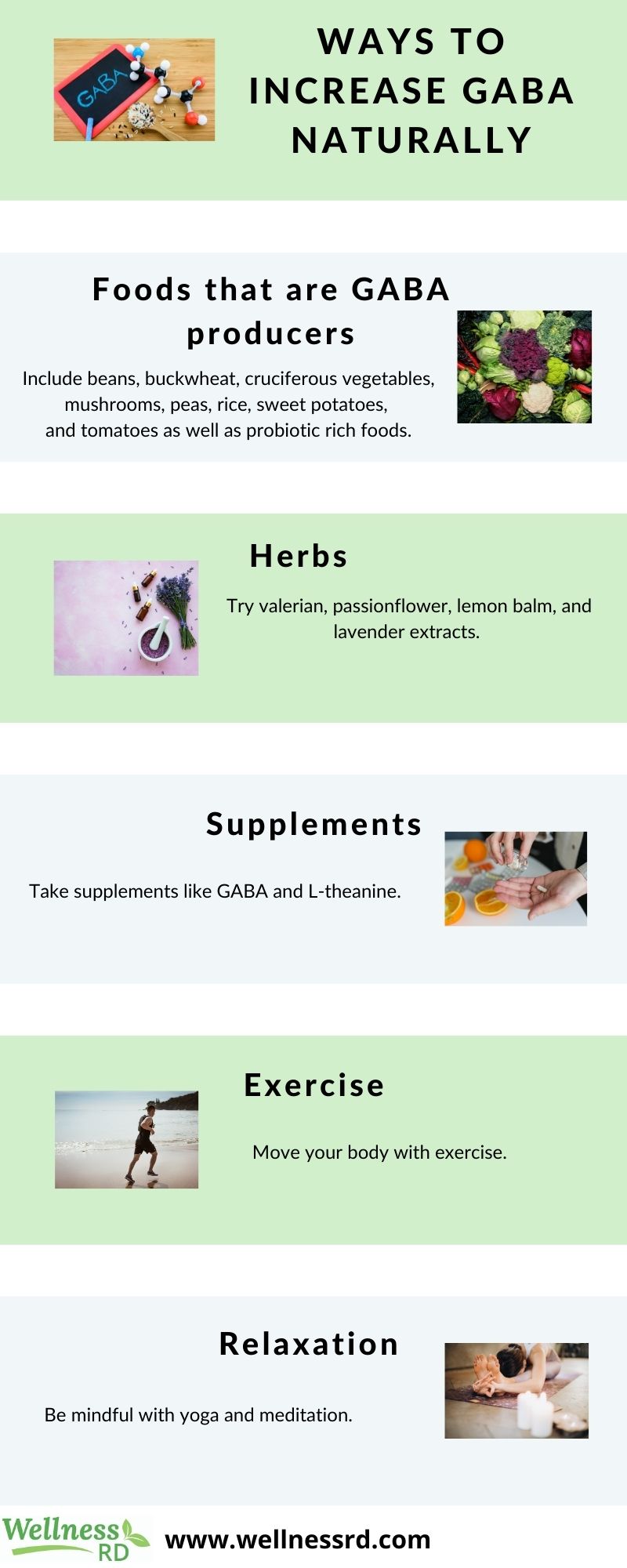
Final Thoughts
In conclusion, GABA is a neurotransmitter in the brain that affects stress, mood, and sleep.
Some symptoms of low GABA may be anxiety, depression, stress, poor sleep, and inability to concentrate.
Possible ways to increase GABA naturally include:
- Foods that are GABA producers
- Herbs that may increase GABA
- Supplements
- Exercise
- Yoga or meditation
Nutrition and lifestyle modifications play a role in stress, mood, and sleep and they are important for your gut and brain health.
Remember, what you eat is important for health and disease prevention.
What you absorb (breaking down the food) and assimilate (gets into the cells) is critical.
Test don’t guess.
Contact me to schedule an appointment to review your personalized nutritional health.
© Amy Archer RDN, CLT, CHWC



